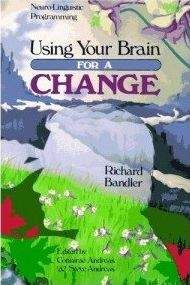Richard Bandler - Using Your Brain —for a CHANGE

Помощь проекту
Using Your Brain —for a CHANGE читать книгу онлайн
If you study people who have phenomenal memories, you find out that they do some really interesting things. One man with an excellent memory puts subtitles under all his pictures. He actually prints words on his pictures that describe what the pictures are about. That short verbal description codes and categorizes the memory, so that it's easy to go back to it. It's like putting a title on a movie, so you can glance at the title and know what it's about without having to watch the entire movie. In the computer business we call that a "drop tag code" — something that is arbitrary but distinctive, that relates to this and also relates to that, linking them together.
We had a woman in a seminar once who was rapidly introduced to forty–five people by first and last name. That's all it took for her to know everyone's name. I've seen Harry Lorayne do the same thing with about three hundred people on a TV show. When this woman was introduced to someone, she would focus on something very distinctive in what she saw — the shape of the nose, skin coloring, chin, or whatever she spontaneously noticed that was unique about that person. She would continue to focus on this distinctive feature as she heard the person's name, and that would connect the two together. She even checked herself quickly by looking away briefly to visualize that unique feature, and listen for the name, to make sure the connection had been made. I like to have people wear name tags, so I don't have to bother to do that. However, it certainly is a useful talent that could be taught to salespeople. They often have to deal with many people, and it's considered important to remember their names and be personally friendly with them.
If you deal with people mostly over the telephone, this visual method won't work. However, you can easily adapt it to the auditory system: notice something distinctive about the person's voice tone or tempo as you hear the name, and hear the name spoken with that distinctive feature. Very visual people might prefer to imagine the name visually as they hear it. You can always adapt a memory strategy in this way, to make it appropriate to the context or the skills of the person who wants to recall something.
If you really want to remember a name, pair it with something unique in all three major representational systems: auditory, visual, and kinesthetic. While you listen to the sound of the name, spoken in his voice tone, you could notice something unique in what you see as you look at him, and also what you feel as you shake hands. Since that gives you a drop tag code in each major system, you will have three different ways to recall the name.
Another way to have a "good memory" is to be as efficient and economical as possible in what you do remember, and to use what you have already remembered as much as possible. For instance, if you always put your keys in the right front pocket of your pants, you only have to remember that once. Someone who puts her keys in many different places may have to remember it four or five times each day, instead of once in a lifetime.
One of our students has a couple of businesses and has to file a lot of papers and records. Whenever something has to be filed, he asks himself, "Where would I look for this when I need it," and starts moving toward the file cabinet. As he does this, an image of a particular file tab appears in his mind, and he files it there. This method uses what he has already remembered to organize his files, so he seldom has to remember anything new. Each time he files this item he strengthens the existing connection between it and the file tab, making the system more dependable each time.
One way of thinking about these two examples is that they create a situation in which you have to remember as little as possible. Here's another example. Take a look at the set of numbers below for a few moments, and then look away and see how much of it you can remember. . . .
149162536496481100
Now look at it long enough so that you can still remember it when you look away. . . .
If you have actually tried this, you probably started to group the numbers into twos or threes to organize the task and make remembering easier:
14,91,62,53,64,96,48,11,00
Or
149,162,536,496,481,100
This is a process we call "chunking": breaking a large task down into smaller, more manageable, pieces. In business there's an old joke, "How do you eat an elephant?" The answer is, "One bite at a time."
At this point, how long do you think you could remember this number accurately? — an hour? — a day? — a week?
Now let's chunk the number a little differently. Does this suggest anything to you?
1 4 9 16 25 36 49 64 81 100
We can write this same set of numbers a little differently, as squares of numbers:122232425262728292102
Now it's obvious that the number we started with is the squares of the numbers 1 through 10, strung together. Knowing this, you can easily remember this number ten or twenty years from now. What makes it so easy? You have much less to remember, and it's all coded in terms of things that you have already remembered. This is what math and science is all about — coding the world efficiently and elegantly, so that you have fewer things to remember, leaving your brain free to do other things that are more fun and interesting.
Those are just a few of the principles that can make remembering a lot easier and faster. Unfortunately they're not yet used much in mainstream education.
"Learning Disabilities "
One of the nice things that happens after you write enough books is that people let you do things that you wanted to do before, but couldn't. Typically by that time you can't quite remember what they were, but I had written some of them down. When I was asked to work for a school district, I had a few things I wanted to go after. One of them is the whole notion of "learning disabilities," "minimal brain dysfunction," "dyslexia," or "educational handicaps." Those are very important – sounding words, but what they all describe is that the teaching isn't working.
Whenever a kid isn't learning, experts are quick to conclude that the problem is a "learning disability," ... but they're never quite clear about who has it! Perhaps you've noticed that they never call it a "teaching disability." The implication is always that the cause of the failure is that the kid's brain is weak or damaged, often by presumed genetic causes. When people don't know how to change something, they often start searching for a way to justify failure, rather than thinking about how they could try doing something different to make it work. If you assume that a kid has a limp learning lobe, then there's nothing you can do about it until they perfect brain grafts.
I'd rather not explain failure that way. I'd rather think about it as a "teaching dysfunction," and at least leave open the possibility that we can learn to change it. If we pretend that you can teach anyone anything, we'll find out where it's not (yet) true. But if we think that when someone isn't learning it means they can't be taught, no one will even try.
In the last century it was common knowledge that man couldn't fly. Then when airplanes became a part of everyday life, most people didn't think it was possible to put a man on the moon. If you take the attitude that anything is possible, you'll find that a lot of things that were previously thought impossible actually do become possible.
The whole idea of "learning disabilities" is based primarily on old neurological "ablation" studies that resulted from a fairly primitive idea of how the brain works: that you can figure out what something does by noticing what happens when it's broken. They would find damage in one part of the brain of someone who couldn't talk, and say, "That's where speech is." That is the same logic as cutting a wire in a television set, noticing that the picture tilts, and saying, "That wire is where the picture straightness is." There are thousands of wires, connections, and transistors involved in holding the picture straight, in a very complex and interdependent system, and the brain is a lot more complex than a TV set. For some of the more primitive areas of the brain there actually is a certain degree of localization of function. However, it's also been known for years that a young child can lose an entire cerebral hemisphere and learn everything all over again perfectly on the other side.
Recent evidence is throwing out a lot of old neurological dogma. In an X–Ray Tomography study they found a college graduate with an 10 of 120 who had such enlarged brain ventricles that his cortex was only about a centimeter thick! Most of his skull was filled with fluid, and according to dogma, he shouldn't have been able to get up in the morning, let alone go to college!
Another old dogma is that in vertebrates no new neurons are formed after birth. Last year they found that the number of neurons in the part of a male canary's brain devoted to singing doubles each spring, and then half of them die off during the rest of the year.
In another study they found that if you remove a monkey's finger, the part of the brain that used to serve the missing finger gets used by the neighboring fingers within a few weeks, and this makes the remaining fingers more sensitive than before. All recent information points to the brain being much more flexible and adaptive than we used to think it was.
I never liked the idea of children being "educationally handicapped," because I never thought that reading was primarily genetic. A child can learn to talk in three years, even in the jungle without Ph.D. parents! Why should it take ten more years to teach him to read the same thing he already knows how to say? Kids in ghettos can learn three languages at once, and they can learn to write all kinds of things in secret codes. But the way things are taught in schools produces a situation in which some kids aren't learning to read. Some of you may remember classes where you didn't learn much because of the atrocious way the material was presented.
Learning to read is really not that difficult. All you have to do is connect the picture of the word with the sound of the word that you already know. If you know the spoken word, you have already connected that sound with an experience of what that word means. When you were a child, you probably learned pretty early that the sound "cat" meant a soft furry little moving thing with claws that meows. The way you do that in your brain is to hear the word "cat" at the same time that you recall your experience of the sight, sound, and feeling of a cat. Then if someone says the word, that experience is there in your mind, and if you see, hear, or feel a cat, the sound of the word is there. All reading does is to add a picture of the word into what you already know. When you see the word "dog," you get a different sound and picture in your mind than when you see the word "cat."
Now that seems pretty simple, and it is. Yet there is an enormous amount of claptrap written about reading problems, and a huge amount of effort goes into trying to solve reading problems. In contrast, there is an NLP–trained group in Denver (see Appendix V) that works with all kinds of educational problems. They will guarantee to raise a kid's reading level, as measured by standard tests, by a minimum of one grade level in a set of eight one–hour sessions. Usually they can make much more progress in a shorter time. In the last three years they have only had to pay off on their guarantee once. Their only prerequisite is that the kid has muscular stability in using his eyes, so he can see what he's trying to read.
Drugs
One of the other things I wanted to go after in the school system is the widespread practice of prescribing drugs like Ritalin for "hyperactive" kids who have trouble sitting quietly in rows for long periods of time, Ritalin slows them down so the teacher can keep up with them. Giving these kids drugs is always defended by saying that the drugs are harmless. One of the interesting things about Ritalin is that although it slows down hyperactive kids, its effect on adults is more like an amphetamine: it speeds them up.
So when I talked to this school district I said, "This Ritalin that you're giving the kids slows them down, but it speeds up adults, right? And you're all convinced that it's perfectly safe, and has no harmful side effects, right? Good. I have a proposal that will save you a lot of money. Stop giving it to the kids, and give it to the teachers, so that they can speed up and keep up with the kids." They were boxed in with their own logic, but they still didn't like it. Try suggesting that at your school and find out how many of those "learning disabled teachers" are willing to take a "perfectly harmless drug." The same thing happens with psychiatrists; they almost never prescribe psychoactive drugs for other psychiatrists when they're hospitalized! After thirty years of prescribing phenothiazine drugs, now they've found it causes something called "Tardive Dyskinesia" later in life. It affects your muscles so you shake all over and have trouble walking or picking up a teacup.
Woman: I'm a teacher, and just last week I was in a staff conference with a diagnostician, a nurse, and another teacher. The nurse said, "I think we should prescribe drugs for this kid," and the others nodded their heads. I got really angry, and said, "I can't believe that with all the focus on drug abuse you're recommending that this kid take drugs! How would you like to take drugs?" The diagnostician said, "I take drugs every night to calm down." And the other teacher said, "So do I." And the nurse said, "I take Valium every day." I couldn't believe it, and I was so shocked I didn't know what to say.
Well, taking drugs yourself is a lot different than forcing them on someone else. I think people should choose their own drugs. What's really sad is that most of the problems people are prescribing drugs for can be changed so easily using NLP. Any NLP practitioner should be able to fix a school phobia in half an hour, and most bad spellers can be made into good spellers in an hour or two.
However, you have to be a little careful now. NLP is starting to get well known, and a lot of unqualified people are claiming to have NLP training. There are even a few people claiming to be "the foremost NLP trainer" who have only gone through one training! That's the kind of thing that happens whenever something effective starts to get known, so be a little cautious and ask a few questions of anybody who claims to be trained in NLP.
Some good NLP people are going back into special education classes and wantonly wiping out all kinds of learning problems right and left. When you know how to find out how someone's brain works, it's relatively easy to teach him how to use it in a way that's more effective and efficient.























